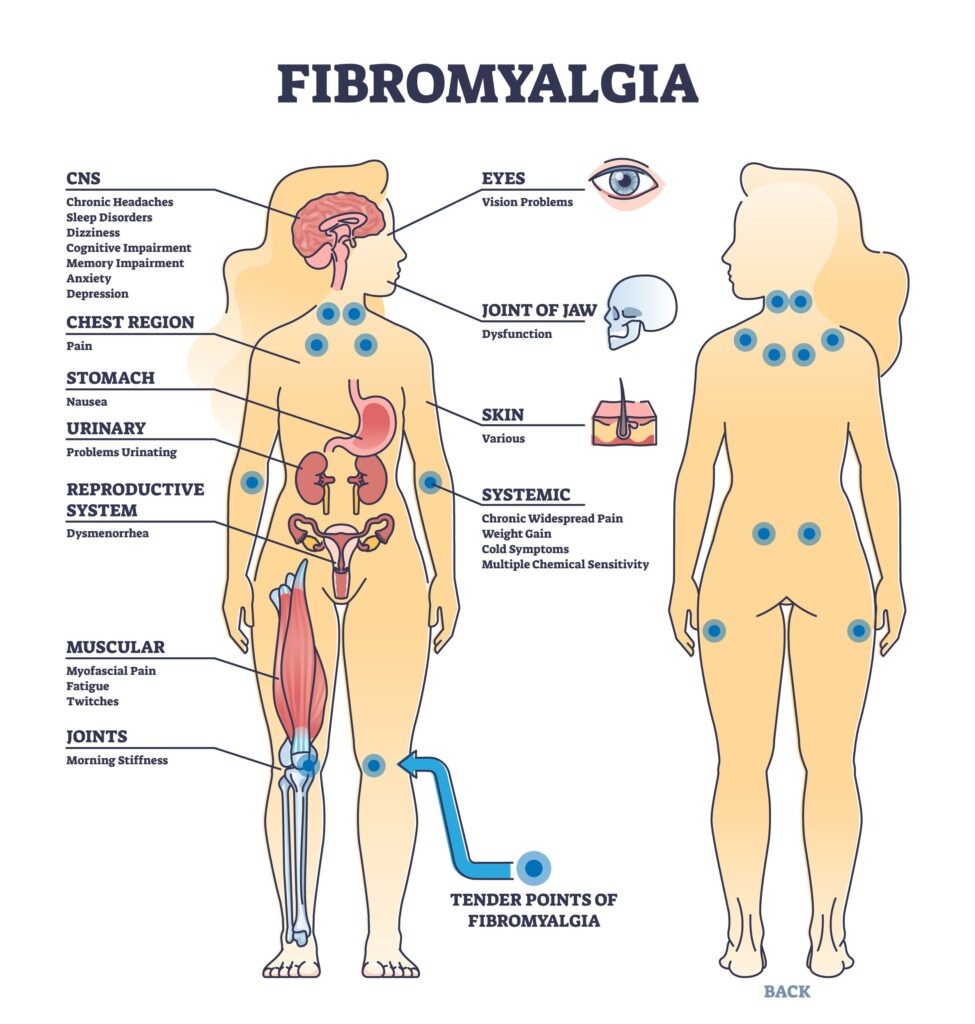Understanding Fibromyalgia
Fibromyalgia, from the Latin roots “fibro” (fibrous tissues), “myo” (muscle), and “algia” (pain), is a chronic condition marked by widespread pain, particularly at tender points near joints. This common yet complex disorder disrupts daily life due to persistent fatigue and tenderness, predominantly affecting women in their middle years. Fibromyalgia may arise independently, alongside conditions like arthritis, or following an injury. Though not fully curable, its symptoms can be effectively managed with appropriate care. At Elite Performance Therapy, we offer specialised sports therapy to reduce pain, combat fatigue, and enhance well-being for those living with fibromyalgia.

Sites of Fibromyalgia Pain
Fibromyalgia manifests as pain in soft tissues across the body, with heightened tenderness in areas such as the neck, lower back, shoulders, and hips. These tender points, while not visibly inflamed, cause significant discomfort and stiffness. Unlike other musculoskeletal conditions, fibromyalgia typically shows no anatomical abnormalities, making clinical assessment critical for diagnosis and treatment planning.
Origins of Fibromyalgia
The causes of fibromyalgia are not fully understood, but the condition is genuine and not psychosomatic, despite misconceptions. Potential contributing factors include:
- Sleep Disruption: Severe sleep issues, reported by 80% of patients, may trigger or worsen symptoms, as studies inducing fibromyalgia-like symptoms through sleep deprivation suggest.
- Autoimmune Associations: Possible links to autoimmune disorders, though unclear whether these are causes or effects.
- Neurological Changes: Reduced serotonin levels, impacting pain, sleep, and mood, alongside increased pain sensitivity.
- Coexisting Conditions: Arthritis, Lyme disease, or thyroid disorders, or injuries that may precipitate fibromyalgia.
- Stress and Emotional Factors: While not primary causes, stress and depression can exacerbate symptoms.
These factors underscore the need for a holistic approach to manage this multifaceted condition.
Symptoms of Fibromyalgia
Fibromyalgia presents intense, fluctuating symptoms that persist long-term, including:
- Widespread pain and stiffness, with tender points near joints.
- Chronic fatigue, unrelieved by rest or sleep.
- Sleep disturbances, such as difficulty falling or staying asleep.
- Tension headaches, numbness, or tingling in the limbs.
- Irritable bowel syndrome, with abdominal pain, constipation, or diarrhoea.
- Depression, memory difficulties, and sensitivity to light, noise, or odours.
- Severe premenstrual syndrome (PMS) pain in women.
These symptoms significantly impair daily functioning, requiring tailored interventions to restore quality of life.
Treatment Strategies
At Elite Performance Therapy, we begin by educating patients about fibromyalgia, validating their experiences and fostering hope for symptom management. Effective treatment involves collaboration between patient, therapist, and doctor, often spanning years, to control symptoms through gentle, non-invasive methods. Our tailored treatments may include:
- Light Sports Massage: Gently applied to areas like the neck and back to improve circulation, reduce stiffness, and ease discomfort without aggravating tender points.
- Proprioceptive Neuromuscular Facilitation (PNF) Stretching: Enhances flexibility in the neck, back, and hips through controlled, gentle stretches, reducing stiffness while avoiding overexertion.
- Rehabilitation Exercises: Low-impact exercises and stretches improve mobility, strength, and energy levels, designed to avoid fatigue. Specific exercises include:
- Neck Tilt Stretch: Gently tilt the head to one side, hold for 20 seconds, repeat 10 times per side to ease neck tension.
- Seated Spinal Stretch: Sit upright, alternate arching and rounding the back, perform 10 cycles to enhance spinal mobility.
- Lifestyle Modifications: Incorporate low-impact aerobic activities like walking or swimming, stress reduction through meditation, and sleep hygiene practices to enhance rest quality.

These gentle therapies help manage pain, fatigue, and related symptoms, enabling patients to maintain daily activities.
Promoting Long-Term Wellness
Preventing fibromyalgia flare-ups involves:
- Gentle Exercise: Regular low-impact activities to maintain mobility and reduce stiffness.
- Stress Reduction: Meditation or relaxation techniques to minimise symptom triggers.
- Sleep Improvement: Consistent bedtime routines to enhance restorative sleep.
- Healthy Lifestyle: Balanced diet and weight management to support overall health.
- Ongoing Therapy: Continued massage therapy to sustain symptom control.
Here at Elite Performance Therapy we provide personalised sports therapy to support your fibromyalgia management. Keen to learn more or ready to kickstart your recovery with a free initial chat? 😊 Click here to get in touch or to book your appointment.
What our clients say:
“I had been seeing Isy at Elite Performance Therapy for tendonitis in my ankle and happened to mention that my wrist was playing up when playing tennis. I hadn’t thought of mentioning it before as presumed it was arthritis. Isy queried if it had ever been officially diagnosed and I sheepishly said no! Isy only spent 10 mins treating my arm and wrist and I have had better flexibility and no pain ever since.. can’t believe it! Thank you!”
C Hall – Tennis player
